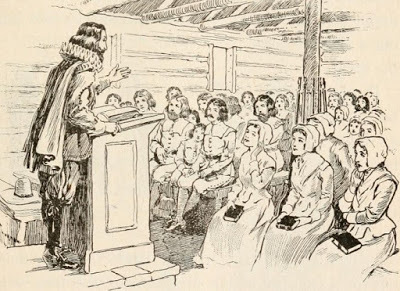Life sketch of Capt. Roger Clapp
© 2018 Christy K Robinson
An unusual place to find an emotional declaration of love: a 17th-century Puritan. I thought Roger Clapp was a relative, but as it turns out, he’s the father-in-law of my eighth great-grandfather. No relation. I still like him for his cheerful gratitude in the face of life-threatening harsh conditions.
Capt. Roger Clapp arrived in Massachusetts Bay two months before Gov. John Winthrop did in 1630, resided in Dorchester, Mass., and was captain of the Castle Fort at Boston Harbor.
Click the link to read about Roger Clapp.
< http://bit.ly/2n4j5DH > (This is my devotional blog, so it has a religious bent. If that is not to your taste, I hope you'll still appreciate the historical context.)
 In his Memoir, Roger Clapp mentioned the Antinomian Controversy, which involved Rev. Wheelwright and Anne Hutchinson, as well as Anne's followers including William and Mary Dyer. Even though Clapp found a true love of Christ in his Puritan church of Dorchester, he had hard feelings for the Hutchinson group, and later on the Quakers. Like his ministers and fellow church members, he thought that grace and forgiveness meant that one thanked God by keeping the Old Testament laws to the best of their abilities.
In his Memoir, Roger Clapp mentioned the Antinomian Controversy, which involved Rev. Wheelwright and Anne Hutchinson, as well as Anne's followers including William and Mary Dyer. Even though Clapp found a true love of Christ in his Puritan church of Dorchester, he had hard feelings for the Hutchinson group, and later on the Quakers. Like his ministers and fellow church members, he thought that grace and forgiveness meant that one thanked God by keeping the Old Testament laws to the best of their abilities.
The Antinomians believed that the Old Testament laws (all the laws, including the Ten Commandments), had been fulfilled with the cross of Christ, and that the new "law" was explained in the New Covenant of Hebrews 8, that God would reveal his will in the minds and hearts of his people. That Puritan Calvinism-versus-New Covenant believers is still debated in churches of the 21st century. And why wouldn't it be, with so many American denominations forming and reforming in northeastern American colonies and states?
This is what Roger Clapp said about the Controversy with the Wheelwright-Hutchinson faction, without naming names:
An unusual place to find an emotional declaration of love: a 17th-century Puritan. I thought Roger Clapp was a relative, but as it turns out, he’s the father-in-law of my eighth great-grandfather. No relation. I still like him for his cheerful gratitude in the face of life-threatening harsh conditions.
Capt. Roger Clapp arrived in Massachusetts Bay two months before Gov. John Winthrop did in 1630, resided in Dorchester, Mass., and was captain of the Castle Fort at Boston Harbor.
Click the link to read about Roger Clapp.
< http://bit.ly/2n4j5DH > (This is my devotional blog, so it has a religious bent. If that is not to your taste, I hope you'll still appreciate the historical context.)
 In his Memoir, Roger Clapp mentioned the Antinomian Controversy, which involved Rev. Wheelwright and Anne Hutchinson, as well as Anne's followers including William and Mary Dyer. Even though Clapp found a true love of Christ in his Puritan church of Dorchester, he had hard feelings for the Hutchinson group, and later on the Quakers. Like his ministers and fellow church members, he thought that grace and forgiveness meant that one thanked God by keeping the Old Testament laws to the best of their abilities.
In his Memoir, Roger Clapp mentioned the Antinomian Controversy, which involved Rev. Wheelwright and Anne Hutchinson, as well as Anne's followers including William and Mary Dyer. Even though Clapp found a true love of Christ in his Puritan church of Dorchester, he had hard feelings for the Hutchinson group, and later on the Quakers. Like his ministers and fellow church members, he thought that grace and forgiveness meant that one thanked God by keeping the Old Testament laws to the best of their abilities. The Antinomians believed that the Old Testament laws (all the laws, including the Ten Commandments), had been fulfilled with the cross of Christ, and that the new "law" was explained in the New Covenant of Hebrews 8, that God would reveal his will in the minds and hearts of his people. That Puritan Calvinism-versus-New Covenant believers is still debated in churches of the 21st century. And why wouldn't it be, with so many American denominations forming and reforming in northeastern American colonies and states?
This is what Roger Clapp said about the Controversy with the Wheelwright-Hutchinson faction, without naming names:
But this glorious Work of God towards his People here was soon maligned by Satan; and he cast into the minds of some corrupt Persons, very erroneous Opinions, which did breed great Disturbance in the Churches. And he [Satan] puffed up his Instruments with horrible Pride, insomuch that they would oppose the Truth of God delivered Publickly: and some times, yea most times they would do it by way of Query, as if they desired to be informed: but they did indeed accuse our godly Ministers of not preaching Gospel, saying they were Legal Preachers, but themselves were for free Grace, and Ministers did Preach a Covenant of Works; which was a false Aspersion on them. The Truth was, they would willingly have lived in Sin, and encouraged others so to do, etc. And yet think to be saved by Christ, because his Grace is free; forgetting (it seems) that those whom Christ doth save from Hell, he also freely of his Grace doth save from Sin; for he came to save his People from their Sins, to give Repentance and Remission of Sins.Clapp described the home meetings of Anne Hutchinson, and her accusations that most ministers preached a Covenant of Works (having to earn salvation with good works) instead of the Covenant of Grace (faith alone in the gift--grace--of Christ's saving power) she said Rev. John Cotton preached. But Cotton would turn his back on Hutchinson, his friend of 20 years, in the early autumn of 1637, when he was pushed to conform to the orthodoxy of New England Puritanism.
Published on January 23, 2018 14:13
No comments have been added yet.



